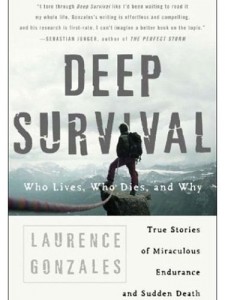Book review: Deep Survival
 The book Deep Survival: who lives, who dies and why, by Laurence Gonzales, asks the question: why do some people survive dangerous situations and other people don’t? The author spends most of his time telling riveting survival stories: plane crashes, mountain climbing accidents, people lost in the woods – they’re all page turners, but Gonzales also pulls out details to offer theories and hypotheses, many of which are relevant to daily life.
The book Deep Survival: who lives, who dies and why, by Laurence Gonzales, asks the question: why do some people survive dangerous situations and other people don’t? The author spends most of his time telling riveting survival stories: plane crashes, mountain climbing accidents, people lost in the woods – they’re all page turners, but Gonzales also pulls out details to offer theories and hypotheses, many of which are relevant to daily life.
I finished the book in two sittings, enjoying the stories and his thoughts on psychology, training, intelligence and stoicism.
The notion I can’t get out of my head is this: people that survive abandon their mental models of the world and open their eyes. They don’t try to force the world to be a certain way: instead they respond to the world like a child, taking it to be what it is, and working within the real world to try and survive (or thrive).
Every day since i’ve read the book I’ve caught myself trying to force something and stopped myself, asking: am I seeing how I want the world to be, or I am I working within the world trying to make it how I want to be?
If you enjoyed Touching the Void, this book will add another level to your appreciation of those stories.

Hey Scott,
Thanks for the heads up on this book. I never heard of it before but from your post it seems like I should pick it up sometime soon. Thanks again and congratulations on your site/blog/books etc… :)
I read somehwere that progress is made by the discontent… ie. by people who try to force things to be they way they want them to be. I guess that makes for a hard choice.
sounds like a great book I will have to get a copy will get back to you later and let you know if it rocks or not..
http://www.survivalbill.ca
http://www.survivalbill.ca/rcblog
the above link is .ca not .com
Scott,
I will have to argue that survival mode means that you have less “space” for risking. If you project the reality you will be risking getting it wrong, and the risk consequence is your life. So it pays off to be more reactive (“eyes open”) to the reality around you.
In a civilized society you can thrive assuming much more risk without the consequence of death :P
PO
In a civilized society, you can often make some other poor dumb jerk eat the risk for your experiments.